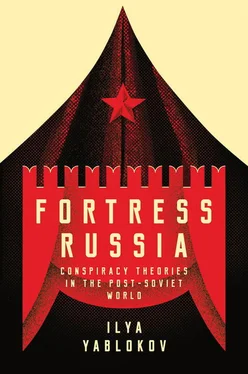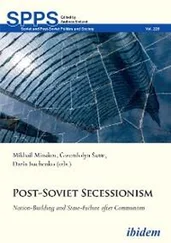These three things were crudely lumped together by Mikhail Leont’ev in his programme Odnako , which was broadcast on Channel One on 17 January. Leont’ev’s pronouncements followed a report which had just been broadcast on the previous programme, Vremia, about Ambassador McFaul’s first Moscow meeting with opposition leaders (Channel One, 2012b). Leont’ev described McFaul as an expert on ‘colour revolutions’, referring to an article published on the popular Russian website Slon entitled Poslom v Rossiiu priezzhaet spetsialist po revolutsiiam ( The arriving ambassador to Russia is a specialist on revolutions ) (Baunov, 2012).
According to Leont’ev, McFaul’s main specialization was the ‘promotion of democracy’. He backed up this claim with a quote from McFaul’s interview with Slon about his positive impressions of the last years of perestroika and his friendship with ‘Russian democrats’. Leont’ev suggested that McFaul financed and trained so-called ‘democratic leaders’ who then took leading positions in Russia in the 1990s, and that in 2010 McFaul had played a central role in the training of the opposition leader Aleksei Navalny at Yale University. Hence Leont’ev tied together the collapse of the USSR, the harsh economic reforms supported by pro-American economists, and the current activities of the opposition movement, implying that these processes were all part of one plan coordinated by one person, Michael McFaul. Later, Leont’ev referred to the US periodical Foreign Policy , which noted that McFaul was the second non-career diplomat appointed to Moscow; the first was Bob Strauss, who, according to Leont’ev, had ‘serviced the collapse of the USSR’. In addition, he held that McFaul was the author of hundreds of ‘anti-Putin’ articles and a book, Russia’s Unfinished Revolution: Political Change from Gorbachev to Putin . This title gave Leont’ev the opportunity to hypothesize that the new ambassador had arrived in Moscow in order to complete the revolution (Analiticheskaia programma ‘Odnako’ s Mikhailom Leont’evym, 2012). The previous academic interests of Ambassador McFaul and, in particular, his research on the origins of the political changes in Ukraine in the mid 2000s (Aslund and McFaul), enabled Leont’ev to speculate about McFaul’s comprehensive knowledge both of the funding schemes of the ‘colour revolutions’, and the financial support provided by the USA to encourage similar events in Russia.
Leont’ev’s short report on Ambassador McFaul’s appointment, broadcast on prime-time television, became another element in the conspiratorial allegations about the presidential electoral campaign. Igor’ Panarin described McFaul as the archetypal conspiratorial mastermind:
Time has shown that he knows how to withstand pressure, quickly adjusts to a changing situation, and obviously has some secret plans about how to implement Aleksei Navalny’s project. So, it is too early for the Kremlin to relax – the fight to prevent chaos and to preserve Russian statehood is yet to come. (Panarin, 2012)
Meeting with opposition leaders on his first day in office made McFaul stand out from traditional diplomats. In addition, he had connections with the Russian political elites of the 1990s, many of whom were considered by pro-Kremlin propagandists to be representatives of the West, and he was very open to dialogue with members of the opposition (Makfol and Pozner, 2012). For these reasons he became an obvious target for anti-American conspiracy theorists. In the ensuing campaign against McFaul they were able to exploit negative Russian attitudes towards the USA: throughout the 2000s, between 25 and 30 per cent of Russians held such attitudes (Levada-tsentr, 2015). McFaul was portrayed as the conspiratorial personification of the USA, supposedly the key coordinator of subversion of the Russian state.
Poklonnaia Hill vs. Bolotnaia Square
The apex of this conspiracy hysteria was the ‘Anti-Orange’ rally on Moscow’s Poklonnaia Hill which was held on 4 February 2012, where leading anti-Western public intellectuals gathered to denounce ‘the orange threat’ (Analbaeva, 2012). This rally was the first in a series of street events that were used to demonstrate the numerical predominance of pro-Putin forces over oppositionists. Among the slogans were: ‘Yes – to fair elections, no – to orange ones’; ‘We won’t let the country collapse’; and ‘Stop begging for scraps at foreign embassies’. These slogans provided a link between the electoral campaigns of 2007 and 2011–12 that also accused ‘foreign embassies’ and the opposition of working to undermine Putin’s regime. The Poklonnaia Hill rally became the ‘patriotic answer’ to the opposition’s third demonstration for fair elections which took place in Moscow on the same day. The ‘patriotic’ rally was supposed to symbolize the attitude of ‘real Russia’ to Putin, as opposed to the anti-Putin rhetoric of the opposition. This same approach would be used later in the Pussy Riot affair.
The Poklonnaia Hill rally had two main aims: to resist the ‘orange threat’, and to express support for Putin. The large number of protesters served to demonstrate that Putin represented the majority of the Russian people, who opposed the minority of ‘dissatisfied Muscovites’. The coverage by state-aligned media channels also stressed the numerical superiority of the pro-Putin demonstrators, giving the figure of ‘more than 100 thousand participants’, in contrast to the anti-Putin rally which was said to have drawn only a quarter of that number ( Gazeta.ru, 2012). In the words of the leaders of the Poklonnaia Hill initiative, the participants of their rally stood up against the political ‘nobody’ ( nichtozhestvo ) which was determined to destroy the country (Ivanov, 2012).
Pro-Putin speakers regularly juxtaposed the two rallies. They were said to symbolize the two parts of Russian society and were evidence of the binary division of the world, which is a typical trope of conspiracy discourse. Most Russians, who were represented by Putin, were said to be concerned with securing stability and peace, while the minority had only one goal – to gain power by any means. Putin and his political allies insisted that the opposition was prepared to falsify the election results to delegitimize the authorities.
A few days before the presidential elections, Putin stated that his opponents were ready ‘to use certain mechanisms’ which would prove that the elections were rigged. ‘They [the members of opposition] will themselves be filling in ballots, they will be controlling it [the course of elections], and then they will assert [that there was fraud at the elections] themselves. We can already see it, we already know it’ (Polunin, 2012). This statement was a pre-emptive step to deal with the possible appearance of videos about electoral procedure violations, as happened with the parliamentary elections of December 2011. If such videos did appear, Putin’s remarks would have prepared the ground for delegitimizing them. If they did not, the legitimacy both of the elections, and of Putin’s return to the presidency, would be self-evident. The majority would be entitled to impose its will on the minority in this supposedly democratic state. By claiming subversive actions on the part of the opposition, Putin aimed to undermine any criticism of the elections.
This portrayal of Putin as spokesperson for the patriotic ‘majority’ was strengthened even more during his pre-election appearance in the Luzhniki stadium, which was timed to coincide with the Defender of the Fatherland Day on 23 February 2012. The rally was preceded by a rally entitled ‘Zashchitim stranu!’ (‘ [We will] defend the country! ’). In his opening speech Leont’ev stressed that Putin was the real saviour of the country, which would otherwise fall victim to a ‘national suicide’ every bit as cataclysmic as the collapse of the Soviet Union in 1991 (Radio Ėkho Moskvy, 2012). Reflecting the symbolic meaning of the day on which the rally was taking place, Putin’s speech was framed by a call for national unity, and pursued a twofold goal. Above all, Putin pointed to the community of ‘the people’ which he led, which was open to everyone who shared its patriotic values and was ready to defend them. He then criticized the unreliable minority, which was striving to act against the interests of its own country:
Читать дальше
Конец ознакомительного отрывка
Купить книгу












